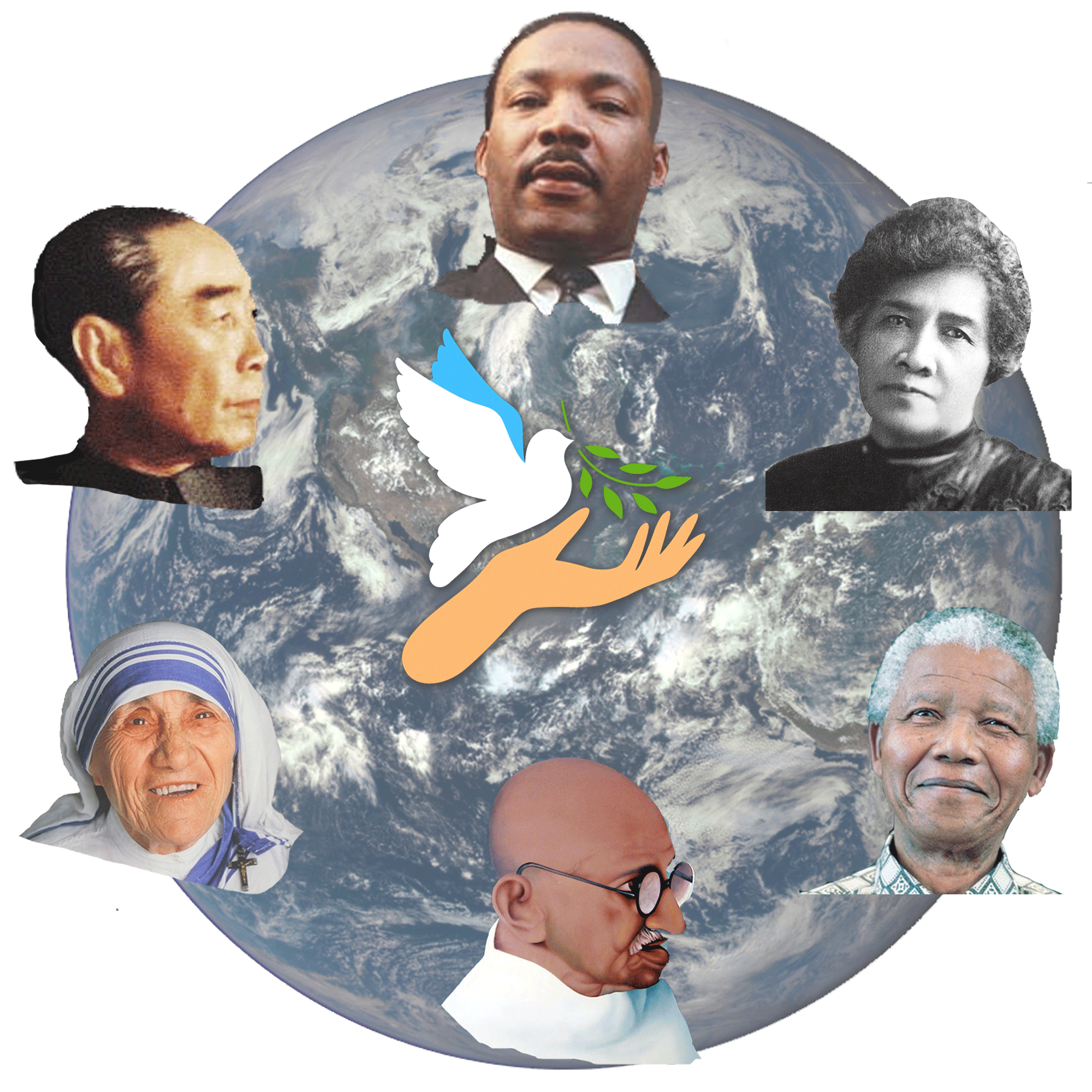
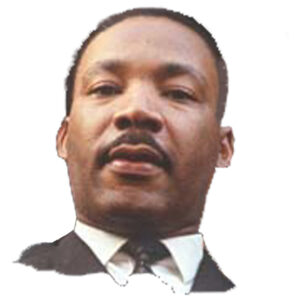 Reverend Martin Luther King Jr.
Reverend Martin Luther King Jr.
Martin Luther King Jr., a Baptist minister and activist, became a central figure in the non-violent fight against racial segregation and discrimination in the United States. Inspired by his faith and Mahatma Gandhi’s teachings, his unwavering commitment to justice transformed America and resonated globally.
Born in Atlanta, Georgia, in 1929, King followed his father’s path into ministry, pursuing theological studies and ordination. His ministry combined spiritual renewal with social justice advocacy.
King’s leadership extended beyond Atlanta, connecting with congregations in major cities and collaborating with diverse Black activists, entertainers, and spokespeople, unifying voices for civil rights.
King’s advocacy for non-violent resistance and his eloquent articulation of the struggle for equality gained international recognition. In 1964, he received the Nobel Peace Prize for his “non-violent struggle for civil rights.” His writings, including “Letter from a Birmingham Jail,” became essential texts in the fight for justice.
In 1963, King delivered his iconic “I Have a Dream” speech at the March on Washington for Jobs and Freedom, inspiring millions with hope and galvanizing support for equality.
- “Darkness cannot drive out darkness; only light can do that. Hate cannot drive out hate; only love can do that.”
- “I have decided to stick with love. Hate is too great a burden to bear.”
- “The ultimate measure of a man is not where he stands in moments of comfort and convenience, but where he stands at times of challenge and controversy.”
- “We must accept finite disappointment, but never lose infinite hope.”
- “Faith is taking the first step even when you don’t see the whole staircase.”
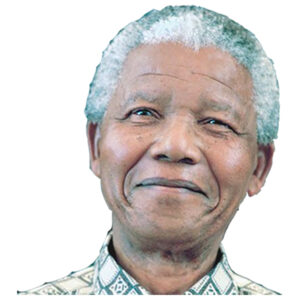 Nelson Mandela
Nelson Mandela
Nelson Mandela, a towering figure in the global struggle for human rights and racial equality, dedicated his life to dismantling South Africa’s oppressive apartheid system and forging a new era of unity and reconciliation.
Joining the African National Congress (ANC) in the 1940s, Mandela actively opposed apartheid, leading to his imprisonment for 27 years. Despite this confinement, he emerged with a spirit of forgiveness and reconciliation.
Engaging in negotiations with President F.W. de Klerk, Mandela helped usher in a peaceful transition to democracy, dismantling apartheid. In 1993, they jointly received the Nobel Peace Prize.
As South Africa’s first democratically elected president, Mandela championed a comprehensive peace and reconciliation process, establishing the Truth and Reconciliation Commission to heal the wounds of the past.
Mandela’s influence extended beyond South Africa, becoming a respected voice in the Non-Aligned Movement, advocating for developing nations and promoting global peace.
Throughout his life, Nelson Mandela embodied the ideals of justice, forgiveness, and unity. His unwavering commitment to racial equality and his pursuit of peace transformed South Africa and inspired countless individuals worldwide. He remains a beacon of hope, demonstrating the power of the human spirit to overcome adversity and create a more just and equitable world.
- “It always seems impossible until it’s done.”
- “For to be free is not merely to cast off one’s chains, but to live in a way that respects and enhances the freedom of others.”
- “Do not judge me by my successes, judge me by how many times I fell down and got back up again.”
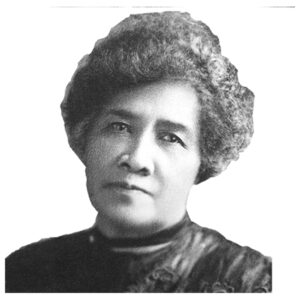 Queen Lili’uokalani
Queen Lili’uokalani
Queen Liliʻuokalani, the last reigning monarch of the Kingdom of Hawaiʻi, embodied resilience and cultural preservation in a time of American expansion. Her life was defined by a deep love for her people, artistic passion, and unwavering commitment to justice.
Born into Hawaiian royalty in 1838, Liliʻuokalani was raised amidst rich traditions and cultural heritage. She excelled in music, arts, and literature, composing beloved songs, including the iconic “Aloha ʻOe.”
In 1891, Liliʻuokalani ascended to the throne; however, her reign was cut short by American business interests and the U.S. military, who overthrew the monarchy and annexed the islands.
Despite being forcibly deposed and imprisoned in 1893, Liliʻuokalani remained steadfast in her commitment to non-violence, urging her people to seek peaceful restoration of sovereignty.
After a year of imprisonment, Liliʻuokalani continued advocating for her people and their culture, traveling widely and engaging in charitable causes to preserve Hawaiian traditions.
Her unwavering commitment to non-violence and dignified response to injustice inspired leaders like Sun Yat-Sen, Mahatma Gandhi, Martin Luther King Jr., and Nelson Mandela, influencing their philosophies of moral power and non-violent resistance.
Liliʻuokalani’s life stands as a testament to resilience, cultural preservation, and the pursuit of justice through peaceful means. She is revered for her love of her people, artistic talents, and unwavering commitment to her nation’s sovereignty.
*
I live in sorrow, imprisoned
Still, I see light, I feel strong and supported
Do not be angry about the errors of man
But forgive and cleanse
So, I ask the universe — protect us beneath your wings
Let peace be our reward, now and forever more
…excerpts from the Queen’s Prayer
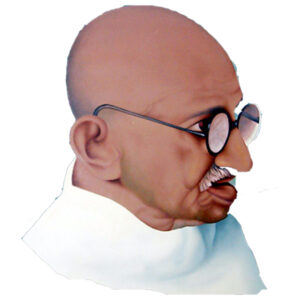 Mahatma Gandhi
Mahatma Gandhi
Mohandas Karamchand Gandhi, known around the world as “Mahatma” (great soul), was the preeminent leader of India’s independence movement, transformed the nation and inspired generations with his unwavering commitment to non-violence, ahimsa, and self-determination. His life’s journey, marked by profound spiritual growth and unwavering activism, left an indelible mark on the world stage.
Shaped by his legal training in South Africa, where he witnessed racial injustice, Gandhi developed his philosophy of satyagraha, a non-violent resistance rooted in truth and love. Deeply influenced by Hindu philosophy, he embraced simplicity and self-discipline.
Gandhi advocated for India’s independence from British rule, leading mass protests and civil disobedience campaigns. His unwavering commitment to ahimsa, a strict non-violence extended to all living beings, became the cornerstone of his movement, empowering followers to resist oppression without violence.
His wife, Kasturba Gandhi, shared his commitment to social justice and ahimsa. Close associates, including Jawaharlal Nehru and Sardar Vallabhbhai Patel, played crucial roles in the independence movement. His son, Arun Gandhi, carries forward his legacy.
Gandhi’s mastery of resonant symbols, such as the Salt Tax March, captured the imagination of the masses and amplified his message. The Salt Tax March, a protest against the British salt tax, demonstrated the power of non-violent resistance.
Even Gandhi’s colonial adversaries respected his integrity and moral authority. While they often disagreed with his methods, they recognized his sincerity and commitment to peace.
Gandhi’s influence extended beyond India’s borders, inspiring leaders like Martin Luther King Jr. and Nelson Mandela, who adopted his principles of non-violent resistance in their respective struggles for civil rights and against apartheid.
- “The weak can never forgive. Forgiveness is the attribute of the strong.”
- “An eye for an eye only ends up making the whole world blind.”
- “There is no way to peace. Peace is the way.”
 Mother Teresa
Mother Teresa
Mother Teresa, a beacon of compassion, dedicated her life to alleviating the suffering of India’s poorest and marginalized, embodying love and empathy.
Born in Skopje, Macedonia, in 1910, Mother Teresa felt a calling to religious life from a young age. At 18, she joined the Sisters of Loreto and embarked on a journey to India, where she would spend most of her life serving the destitute.
In 1950, she founded the Missionaries of Charity, a religious order dedicated to serving the poorest of the poor. With a small group of nuns, she established a home for the dying in Calcutta, providing care and dignity to those often overlooked.
Her work extended beyond the hospice walls, tirelessly seeking out those in need throughout Calcutta’s slums. She cared for the sick and dying, comforted abandoned children, and provided food and shelter to those with nowhere else to turn.
Her unwavering commitment earned her global recognition. In 1979, she received the Nobel Peace Prize for her “work for bringing help to suffering humanity.” She received numerous other honors, including India’s highest civilian award, the Bharat Ratna.
Despite international acclaim, Mother Teresa remained humble and focused on her mission. She became a powerful advocate for peace, speaking out against violence and injustice. Her voice carried moral authority, and she was often sought out by world leaders for her wisdom and guidance.
Mother Teresa’s legacy extends far beyond her lifetime. Her Missionaries of Charity continue to serve the poor in over 130 countries, carrying on her mission of compassion and selfless service. She remains an inspiration to millions worldwide, a symbol of love, empathy, and unwavering dedication to humanity.
- “Love begins at home, and it is not how much we do…but how much love we put in that action.”
- “If you judge people, you have no time to love them.”
- “Not all of us can do great things. But we can do small things with great love.”
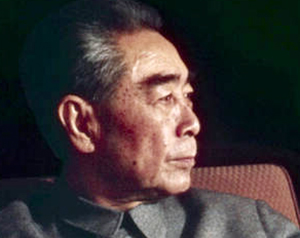 Zhou Enlai
Zhou Enlai
Zhou Enlai, the first Premier of the People’s Republic of China and Minister of Foreign Affairs, played a pivotal role in shaping China’s foreign policy during the Cold War era. His diplomatic acumen and unwavering commitment to peace made him a key figure in navigating complex international relations.
Zhou Enlai championed the Five Principles of Peaceful Coexistence, emphasizing mutual respect, non-aggression, and non-interference in international relations. He promoted these principles at the Bandung Conference, fostering cooperation among Asian and African nations.
Zhou Enlai’s diplomatic skills were evident during the Xian Incident, where he successfully negotiated the release of Chiang Kai-shek, demonstrating his ability to bridge political divides.
In the 1970s, Zhou Enlai played a crucial role in thawing Sino-American relations. He facilitated the Shanghai Communiqué and “Ping Pong Diplomacy,” initiating a new era of cooperation. Zhou Enlai’s contributions extended to the Geneva Conference, where he helped negotiate a ceasefire in the First Indochina War, exemplifying his commitment to peaceful resolutions.
Throughout his career, Zhou Enlai consistently promoted peace and understanding, advocating for diplomacy and cooperation among nations, leaving a lasting legacy as a champion of a more harmonious world.
“The Five Principles of Peace:
1. Mutual respect for each nation’s territorial integrity and sovereignty
2. Mutual non-aggression
3. Mutual non-interference in each other’s internal affairs
4. Equality and mutual benefit
5. Peaceful co-existence”
“If these principles were applied not only between various countries but also in international relations generally, they would form a solid foundation for peace and security, and the fears and apprehensions that exist today would give place to a feeling of confidence…”
About 2023 Special Recognition Peace Leader,
Chief Arvol Looking Horse